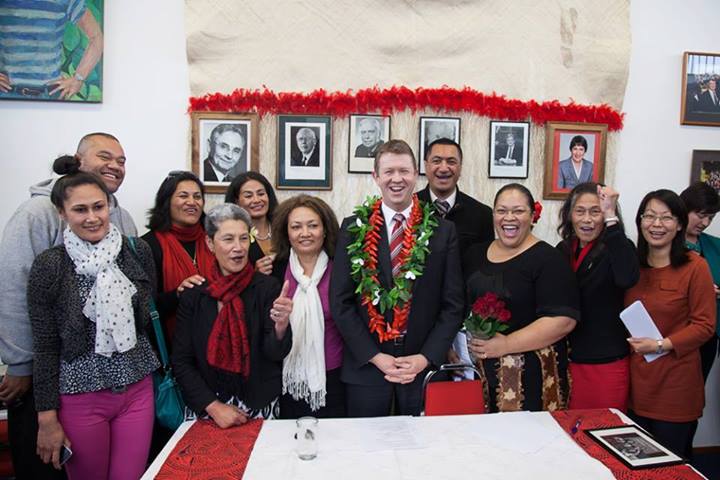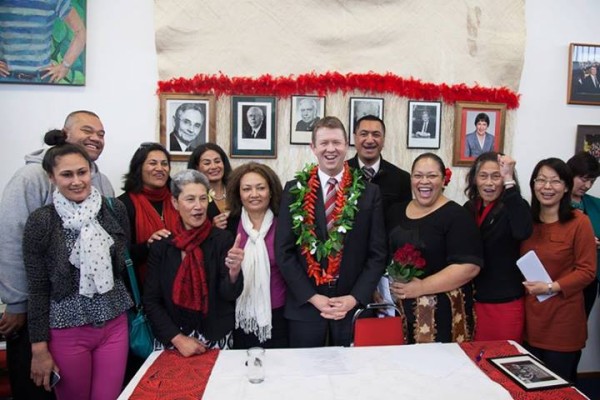I remember following the 1984 election with excitement. My parents had always voted Labour and were keen for a Lange-Labour win in 1984 because they’d had enough of Muldoon. Whilst I didn’t understand much of their dissatisfaction with National at the time, the one thing I knew without any doubt was that David Lange inspired my parents. He was a big man, who had a big voice, was highly intelligent and had real presence. Every time he was on the news my parents were mesmerized telling me that I should follow this man and listen carefully to everything he had to say.
As a Samoan I’ve been raised in an oral tradition. My dad was a pastor and lay preacher for many years. Watching him from the pulpit for many years gave me a real sense of how you could best communicate a message – Dad’s were powerful and persuasive (and of course I’d say that, I was his son and good Samoan kids obey their parents). In many ways I saw David Lange as possessing the skills of a powerful and dynamic communicator, similar to the many church ministers and lay preachers that I was being exposed to as a child. Lange was a lay preacher of the Methodist Church I later discovered.
Pasifika people are drawn to great communicators; communicators who are dynamic, humorous, firm and persuasive. Looking back on the 1984 election, it was these attributes that won Lange so much favour amongst our people. Over the years I’ve seen how our people have been drawn to the likes of Helen Clark, Vaovasamanaia Winston Peters and in recent times, David Cunliffe. Whilst none of them are a complete replica of Lange, each of them possesses the traits that Samoan people are looking for in a leader.
In a recent blog I talked about how dynamic and inspirational Rev Uesifili Unasa was as he spoke of his vision for Auckland, acknowledging that his humble demeanour and powerful ability to communicate are huge assets to his political pursuit to become Mayor of Auckland. Coming from an oral tradition means that the lens we look through is slightly different from what may draw others to political leaders. Of course any politician is going to need decent communication abilities to get noticed.
I was one of a number of Samoans and other Pasifika people that packed out David Cunliffe’s New Lynn office when he announced his decision to seek the leadership of the Labour Party. It’s fair to say that amongst many Pasifika people in Auckland, David Cunliffe is the person they want as Labour’s leader. Cunliffe espouses the traits that naturally lend themselves to drawing Pasifika support – he’s intelligent, personable and a very good communicator. Admittedly, Jones and Robertson have those characteristics too, but I think his support amongst Pacific people comes from us feeling that he’s had a rough deal in the last couple of years. With so many Pasifika Labour members at his announcement, I believe it is fair to say that he has the support of Pasifika within the Party. Su’a William Sio is publicly supporting his bid for the leadership and that endorsement will have weighting in the community.
Watching the election coverage in 1984 was like sitting at the movie theatre trying to anticipate what would develop next. Late in the evening, David Lange emerged from behind the curtain on stage to give his speech as Prime Minister-elect. His speech was moving and inspirational. And whilst his government’s neo-liberal agenda that followed will always be an indictment on his administration with the awful effects still being felt today, his speech and person were indicative of the leadership Pasifika people are won to. Almost 20 years on it’s a different David and a slightly different context. This David claims to have learned a number of lessons from his time on the backbench in bringing some healing to troubled relationships within the caucus. Moreover, he has the intelligence, personality, work ethic and perhaps more importantly, a groundswell of support amongst Pacific voters to lead Labour to victory in 2014. And it’s that vote located mainly in south and west Auckland that Labour needs to inspire to the booths next year. I’m convinced that under Cunliffe’s leadership Pasifika voters will both be inspired to the booth and others, back to Labour.







Interested to know what you’ll be inspired about.
Right. Cunliffe is Just Like the great betrayer, so we should vote for him?
Don’t quite buy that, but thanks for highlighting a danger in relying on demagogic oratory.
How is Cunliffe like the great betrayer? Care to provide some proof. You need to establish the existence of false claims to prove the oratory performance was of of the demagogic kind. Emotion-based arguments is only half the equation. You’re either confused or deliberately disparaging.
Oh, I am so relieved, to read this article by Efeso, as most in the wider “media” (circus) seem to be cheering on and holding up Shane Jones as “da man” for “da leadership”.
I dread turning on the radio, as most talk back hosts and moderators, especially the ones on Radio Live, seem to think that the public want Jones, and would not have a bar of Cunliffe or Robertson. It is frightening what bias is being applied, and how attempts are made to manipulate the public, many of whom have insufficient information about the contenders for Labour’s leadership and for future Prime Minister.
Many in the mainstream media should be damned ashamed of themselves, to interfere into political debate, which is not proper debate about policies anymore, it is all about “personalities”, agendas, about who has which negative attributes or not. I hear nobody apart from few mention what Shane Jones was involved in, and what has not been sufficiently cleared up. But anyway, it all smells like a highly suspicious agenda, what is going on, with the media, who have so far also cheer-led John Key, and let him off the hook with so damned much.
So I am glad that someone gives credit to David Cunliffe. Yet as an outside observer, I raise a bit of cauting re the man, re Labour as a whole, as David Cunliffe, same as the other leadership contestants, are shying away from making clear comments on what social policies they would prefer and promote.
There are people on the fringes, who suffer immensely under this government, through no fault of their own, in many cases simply being “guilty” of being seriously ill or disabled, and thus incapacitated to do work. Yet there is an ominous silence on the side of Labour, and until I have heard and received re-assurances about a fairer, respectful and inclusive approach towards beneficiaries, I will personally not vote for Labour, no matter Cunliffe, Robertson or Jones leads the party into the coming elections.
We out here want more than the standard fare slogans and oratory skills being applied. Words without backing and action are without much substance. I hope my words here will be taken serious and answered to in not too distant a future.
Thanks to all you contenders for the Labour leadership job, dear David, Grant and Shane!
It is not for the leadership candidates to espouse policy. They should be focusing on what they bring to the Labour movement and how they would lead the party to victory at the 2014 Election. Policy is a party matter to be worked on when a new leader is elected.
Chris –
“It is not for the leadership candidates to espouse policy.”
While I know that, we should be able to expect and get a basic consensus on social policy and what direction Labour and the leadership contenders stand for, and what future policies are likely to come our way.
Some MPs have referred to the existing social security policies, but they are mostly the ones that were presented for the 2011 election. I understand that policies are likely being worked on, and that the coming annual conference will determine more policies, and send a few clearer signals.
Leaders should know the bottom line of what their social policy will entail, and therefore be able to give some assurances. We get this for the economic and employment areas, but not welfare, and that is more than a shame.
There are many out there, who depend on benefits through no fault of their own, and they could be potential Labour voters also, leaving them in worry and despair, which this silence on social policy is creating, does not help Labour nor the affected and society as a whole.
Having witnessed the draconian, punitive benefit reforms pushed through by the Nat led government, and Labour only letting a few MPs hold some reasonably good speeches in Parliament, but otherwise not comment all that much, that was a shocking realisation to me. It is as if Labour silently is not that unhappy about National doing the “dirty” work, so they can later come and say, well, we may modify this and that a bit, but generally will not do much to reverse the nasty bits of the reforms, like increased outsourcing of services, punitive sanctions, allowing a controversial Principal Health Advisor oversee and promote the introduction of UK style work capability assessments – while comparing benefit dependence with “drug dependence”.
That man, Dr David Bratt was hired by MSD in 2007 under the last Labour led government, and this is a fact that really disturbs me and a fair few others.
I don’t think we should expect a consensus on Party Policy.
Now personal opinion is a different matter, everything the candidates have said to date I take it as their personal opinion and will vote accordingly.
Must keep party policy and personal opinions well and truly separated
Party policies start of as personal opinions, very strong ones in some cases. When they’re shared by enough people they take on a political life in the form of political promises. They are discussed, amended as fit, rejected in some cases and then the remainder voted in as formal party policy.
What do you think formal party policies start of as? Marshmallow cupcakes? Without personal opinion party policy isn’t possible.
Secondly, when politicians go around espousing their vision and what they’d do when they get into government have you ever heard any of them say, “hang on, those promises I made, they’re just my personal opinion not party policy”. Since never. Why? Because they’re not stupid. Why say something that would ruin your chances of being elected. But do they and we the voters understand that not all promises or opinions as you call them become party policy? Yes, we do. We don’t need to be told they’re opinions. What’s important is we like or don’t like them. We vote for the person whose “personal opinions” are shared by us in the hope that these will actually become policy, as promised.
So in regards to “Must keep party policy and personal opinions well and truly separated” what exactly is your point?
Malo uso!
Interesting read – and a good analysis of the pacific island political views.
I’m also convinced that Cunliffe could lead Labour to victory in 2014.
Forget Shane Jones – the man has too much baggage and not enough depth.
Comments are closed.